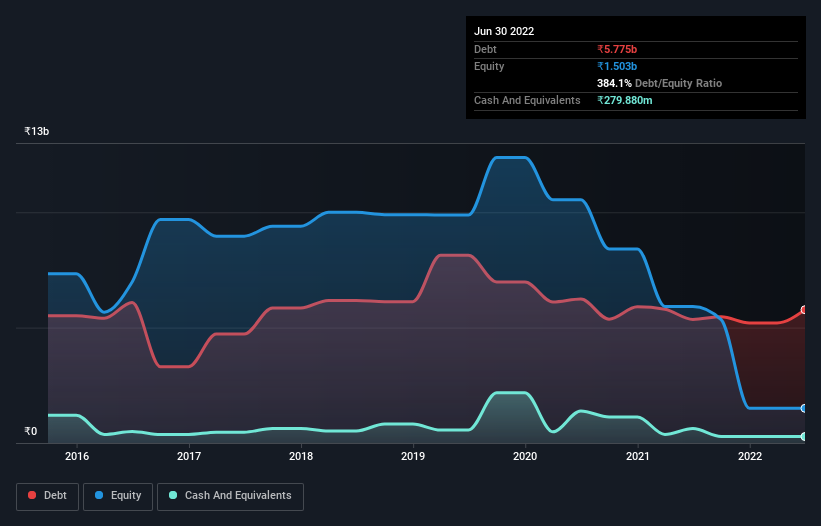Future Consumer (NSE:FCONSUMER) Has Debt But No Earnings; Should You Worry?

The external fund manager backed by Berkshire Hathaway's Charlie Munger, Li Lu, makes no bones about it when he says 'The biggest investment risk is not the volatility of prices, but whether you will suffer a permanent loss of capital.' When we think about how risky a company is, we always like to look at its use of debt, since debt overload can lead to ruin. As with many other companies Future Consumer Limited (NSE:FCONSUMER) makes use of debt. But should shareholders be worried about its use of debt?
When Is Debt A Problem?
Debt is a tool to help businesses grow, but if a business is incapable of paying off its lenders, then it exists at their mercy. If things get really bad, the lenders can take control of the business. While that is not too common, we often do see indebted companies permanently diluting shareholders because lenders force them to raise capital at a distressed price. Having said that, the most common situation is where a company manages its debt reasonably well - and to its own advantage. When we examine debt levels, we first consider both cash and debt levels, together.
Check out our latest analysis for Future Consumer
What Is Future Consumer's Debt?
The image below, which you can click on for greater detail, shows that at March 2022 Future Consumer had debt of ₹5.77b, up from ₹5.35b in one year. However, it does have ₹279.9m in cash offsetting this, leading to net debt of about ₹5.50b.

A Look At Future Consumer's Liabilities
Zooming in on the latest balance sheet data, we can see that Future Consumer had liabilities of ₹8.11b due within 12 months and liabilities of ₹2.61b due beyond that. Offsetting these obligations, it had cash of ₹279.9m as well as receivables valued at ₹1.53b due within 12 months. So its liabilities outweigh the sum of its cash and (near-term) receivables by ₹8.91b.
The deficiency here weighs heavily on the ₹3.77b company itself, as if a child were struggling under the weight of an enormous back-pack full of books, his sports gear, and a trumpet. So we definitely think shareholders need to watch this one closely. At the end of the day, Future Consumer would probably need a major re-capitalization if its creditors were to demand repayment. The balance sheet is clearly the area to focus on when you are analysing debt. But it is Future Consumer's earnings that will influence how the balance sheet holds up in the future. So when considering debt, it's definitely worth looking at the earnings trend. Click here for an interactive snapshot.
In the last year Future Consumer wasn't profitable at an EBIT level, but managed to grow its revenue by 14%, to ₹13b. That rate of growth is a bit slow for our taste, but it takes all types to make a world.
Caveat Emptor
Importantly, Future Consumer had an earnings before interest and tax (EBIT) loss over the last year. Indeed, it lost a very considerable ₹3.4b at the EBIT level. When we look at that alongside the significant liabilities, we're not particularly confident about the company. It would need to improve its operations quickly for us to be interested in it. For example, we would not want to see a repeat of last year's loss of ₹5.1b. In the meantime, we consider the stock to be risky. The balance sheet is clearly the area to focus on when you are analysing debt. But ultimately, every company can contain risks that exist outside of the balance sheet. For instance, we've identified 3 warning signs for Future Consumer (1 shouldn't be ignored) you should be aware of.
If you're interested in investing in businesses that can grow profits without the burden of debt, then check out this free list of growing businesses that have net cash on the balance sheet.
New: AI Stock Screener & Alerts
Our new AI Stock Screener scans the market every day to uncover opportunities.
• Dividend Powerhouses (3%+ Yield)
• Undervalued Small Caps with Insider Buying
• High growth Tech and AI Companies
Or build your own from over 50 metrics.
Have feedback on this article? Concerned about the content? Get in touch with us directly. Alternatively, email editorial-team (at) simplywallst.com.
This article by Simply Wall St is general in nature. We provide commentary based on historical data and analyst forecasts only using an unbiased methodology and our articles are not intended to be financial advice. It does not constitute a recommendation to buy or sell any stock, and does not take account of your objectives, or your financial situation. We aim to bring you long-term focused analysis driven by fundamental data. Note that our analysis may not factor in the latest price-sensitive company announcements or qualitative material. Simply Wall St has no position in any stocks mentioned.
About NSEI:FCONSUMER
Future Consumer
Engages in the sourcing, manufacture, branding, marketing, and distribution of food and processed food products, and health and personal care products in India.
Low and slightly overvalued.
Similar Companies
Market Insights
Community Narratives



